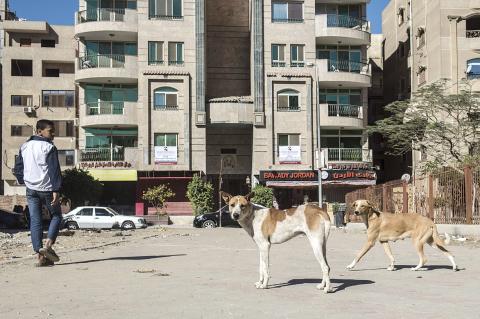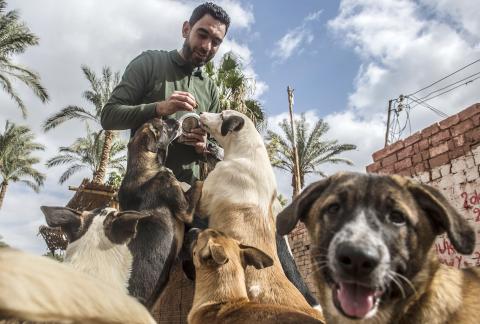Alaa Hilal was out shopping in Cairo when she was attacked by a stray dog in broad daylight — an increasing problem of daily life in Egypt which is stirring debate.
“I got out of my car and saw an exceptionally large street dog,” the 38-year-old housewife said at her home, northeast of Cairo.
“He approached me and bit me without barking or doing anything else,” said Hilal, adding that she had been injured in the thigh. An overpopulated mega-city of more than 20 million people, Cairo is already plagued by monster traffic jams, widespread waste problems and rampant pollution. Packs of stray dogs are only adding to the city’s challenges.

Photo: AFP
Complaints about dog attacks, exposure to rabies and in some cases even deaths over the years have triggered calls for the animals to be brought under control.
HOUNDS UNLEASHED
Commonly referred to as “baladi dogs,” strays are widely viewed as unsanitary and dirty. They are typically seen running around the streets and scavenging garbage for food.

Photo: AFP
According to the agriculture ministry, there were around 400,000 cases of dog bites in 2017, up from 300,000 in 2014. And 231 people died over the past four years from the wounds they received, mainly as a result of rabies.
A bite from a dog carrying the rabies virus can be fatal within 24 hours as it damages the human’s nervous system, said Shehab Abdel-Hamid, the head of Egypt’s society for the prevention of cruelty to animals (SPCA). Hilal, who had never feared dogs having had several pets when growing up, was rushed to a nearby hospital only to discover that she was the ninth person to be bitten by the same dog.
“Due to the trauma caused by this incident, I became worried and I no longer want to be in the same place with them,” she said.

Photo: AFP
There are no official data on the numbers of stray dogs, but activists say they are running loose in their millions.
A survey by the SPCA showed that the number of stray dogs “may reach up to more than 15 million”, Abdel-Hamid said.
And though street dogs appear to fear the most crowded areas, they can be loud and aggressive in poorly lit and rubbish-strewn suburbs. In November, a video widely circulated on social media showed a car hitting a teenager who was being chased by two stray dogs.
“Garbage is the main reason behind the stray dogs’ crisis in Egypt,” said Abdel-Hamid, highlighting how the problem was exacerbated when the rubbish men stopped working during the 2011 uprising.
GOVERNMENT MAULED
The SPCA, however, lacks resources. Its headquarters in downtown Cairo was looted during the uprising and has not been renovated since, Abdel-Hamid added. And Egyptian authorities say they can only intervene on a case by case basis. “We do not go around the streets looking for dogs to kill them,” said the agriculture ministry spokesman Hamed Abdel-Dayem. “We only take measures following complaints.”
He didn’t specify what measures are taken to bring the stray dog population under control. But animal rights advocates often lambast the government, accusing it of mass culls.
In 2017, authorities killed more than 17,000 stray dogs following multiple complaints of dog “disturbances” and “biting” in Beni Sueif, south of Cairo, according to an August report by the governorate’s veterinary directorate. The Red Sea governor even offered a 100 Egyptian pounds (US$5.58) award to those who capture and hand over at least five strays.
Animal rights defenders also accuse the government of killing dogs using a drug, known as “strychnine”, a chemical substance listed as “unacceptable on animal welfare grounds” for euthanasia by the World Organization for Animal Health. But Abdel-Dayem denied that the government imported banned substances.
“Is it logical that we (the ministry) allow internationally prohibited substances to enter the country?” he said when asked about the strychnine claim.
SHELTER OF ‘HOPE’
Animal rights advocates have sought to offer solutions, actively removing dogs from the streets and giving them homes.
Ahmed al-Shorbagi, 35, opened two dog shelters in a desert area west of Cairo, near the famed Giza pyramids. The buildings with sheer concrete walls have kept more than 250 dogs safe for the past three years. Shorbagi contributes 40 percent to the funding of the shelters while the rest comes from donations. “At first I followed the animal rescue pages on Facebook,” Shorbagi said, rubbing one dog’s belly as she wagged her tail in joy.
“I saved a dog that I called ‘Hope’ and when I opened the shelter, I named it after her.”
Shorbagi believes the solution lies in dog sterilization programs, providing rabies vaccinations and removing the garbage. “Instead of the government paying millions of dollars to import poison, it should consider sterilization,” he said. “We, as associations, proposed to the ministry of agriculture to solve the problem but it refused.”
The ministry’s spokesman denied however refusing to cooperate with private entities and hailed their work to help resolve the crisis.

The primaries for this year’s nine-in-one local elections in November began early in this election cycle, starting last autumn. The local press has been full of tales of intrigue, betrayal, infighting and drama going back to the summer of 2024. This is not widely covered in the English-language press, and the nine-in-one elections are not well understood. The nine-in-one elections refer to the nine levels of local governments that go to the ballot, from the neighborhood and village borough chief level on up to the city mayor and county commissioner level. The main focus is on the 22 special municipality

The People’s Republic of China (PRC) invaded Vietnam in 1979, following a year of increasingly tense relations between the two states. Beijing viewed Vietnam’s close relations with Soviet Russia as a threat. One of the pretexts it used was the alleged mistreatment of the ethnic Chinese in Vietnam. Tension between the ethnic Chinese and governments in Vietnam had been ongoing for decades. The French used to play off the Vietnamese against the Chinese as a divide-and-rule strategy. The Saigon government in 1956 compelled all Vietnam-born Chinese to adopt Vietnamese citizenship. It also banned them from 11 trades they had previously

Jan. 12 to Jan. 18 At the start of an Indigenous heritage tour of Beitou District (北投) in Taipei, I was handed a sheet of paper titled Ritual Song for the Various Peoples of Tamsui (淡水各社祭祀歌). The lyrics were in Chinese with no literal meaning, accompanied by romanized pronunciation that sounded closer to Hoklo (commonly known as Taiwanese) than any Indigenous language. The translation explained that the song offered food and drink to one’s ancestors and wished for a bountiful harvest and deer hunting season. The program moved through sites related to the Ketagalan, a collective term for the

As devices from toys to cars get smarter, gadget makers are grappling with a shortage of memory needed for them to work. Dwindling supplies and soaring costs of Dynamic Random Access Memory (DRAM) that provides space for computers, smartphones and game consoles to run applications or multitask was a hot topic behind the scenes at the annual gadget extravaganza in Las Vegas. Once cheap and plentiful, DRAM — along with memory chips to simply store data — are in short supply because of the demand spikes from AI in everything from data centers to wearable devices. Samsung Electronics last week put out word